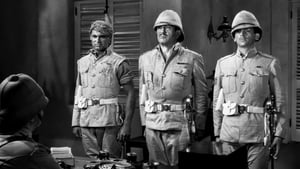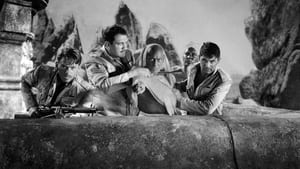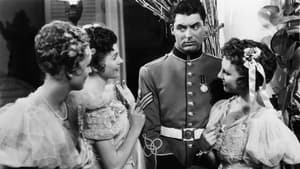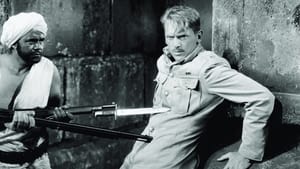Contact: info@alwanfilm.com
Video Sources 0 Views
- Watch trailer
- Gunga Din

Synopsis
Table of Contents
ToggleReview: Gunga Din 1939 Colorized – A Timeless Adventure Epic in Vibrant Color
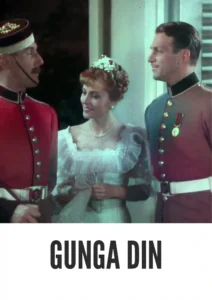
Introduction
“Gunga Din” (1939) stands as a monumental achievement in the realm of adventure cinema, weaving together a thrilling tale of heroism, camaraderie, and sacrifice against the backdrop of colonial India. In this review, we’ll explore the significance of this early colored film, examining its impact on audiences and its enduring legacy in the annals of cinematic history.
Check The Full Colorized Movies List
Check Our Colorized Movies Trailer Channel
Understanding Gunga Din 1939 Colorized: Director, Cast, and Genre
Directed by the legendary George Stevens, “Gunga Din” (1939) showcases his masterful command of the cinematic medium, blending breathtaking action sequences with moments of humor and pathos. The film features a stellar cast, including Cary Grant, Victor McLaglen, and Douglas Fairbanks Jr., whose dynamic performances breathe life into their iconic characters. Combining elements of adventure, drama, and comedy, “Gunga Din” (1939) transports viewers to a world of danger and intrigue, where courage and friendship are put to the ultimate test.
Exploring the World of Gunga Din 1939 Colorized: Plot and Characters
At its core, “Gunga Din” (1939) follows the exploits of three British sergeants stationed in colonial India, who find themselves embroiled in a perilous quest to thwart a murderous cult intent on plunging the region into chaos. Along the way, they encounter Gunga Din, a loyal water bearer whose selfless bravery inspires them to rise above their differences and unite against a common enemy. As they journey deep into the heart of enemy territory, they discover the true meaning of honor, sacrifice, and heroism in the face of overwhelming odds.
The Art of Film Colorization
Film colorization serves as a transformative tool that enhances the visual experience of classic movies, breathing new life into timeless stories and captivating audiences with vibrant hues. By digitally adding color to black and white films, colorization allows viewers to immerse themselves in the rich tapestry of cinematic worlds, exploring every nuance and detail with fresh eyes and renewed appreciation.
Early Colored Films: A Brief History
The history of colored films traces its roots back to the early days of cinema, with filmmakers experimenting with various techniques to add color to their creations. From hand-tinted frames to early Technicolor processes, the evolution of colored film has been marked by innovation and ingenuity, paving the way for the development of modern colorization techniques that continue to captivate audiences to this day.
Gunga Din 1939 and Its Early Colored Version
The decision to release “Gunga Din” (1939) in a colorized format was met with both excitement and trepidation. While some welcomed the opportunity to experience the film in vibrant color, others expressed concerns about the potential impact on its visual aesthetic. Nevertheless, the early colored version of “Gunga Din” (1939) offers viewers a fresh perspective on the timeless tale of adventure and heroism, enhancing its immersive qualities and captivating audiences with its stunning visual imagery.
The Debate Over Film Colorization
The debate over film colorization continues to divide audiences and critics alike, with proponents praising its ability to breathe new life into classic movies and introduce them to a new generation of viewers, while detractors argue that it compromises the artistic integrity of the original work and diminishes its historical significance. As the debate rages on, filmmakers and audiences alike are left to ponder the merits and drawbacks of colorization in the ever-evolving landscape of cinema.
Examining Gunga Din 1939 as an Early Colored Film
As with any colorized classic, the impact of colorization on “Gunga Din” (1939) is a matter of personal interpretation. Some may argue that it enhances the film’s visual appeal and immerses viewers in its world, while others may feel that it detracts from the stark beauty of the original black and white version. Regardless of one’s stance on the issue, there’s no denying the enduring power of “Gunga Din” (1939) as a timeless adventure epic that continues to capture the imagination of audiences around the world.
Influence and Legacy: Gunga Din 1939 Colorized’s Impact on Cinema
“Gunga Din” (1939) has left an indelible mark on the world of cinema, inspiring countless filmmakers and captivating audiences with its thrilling action, memorable characters, and breathtaking cinematography. From its unforgettable performances to its sweeping vistas, the film continues to resonate with viewers of all ages, reaffirming its status as a beloved classic of the adventure genre.
Director’s Cinematic Legacy: Beyond Gunga Din 1939 Colorized
George Stevens’ influence extends far beyond “Gunga Din” (1939), with a diverse body of work that continues to captivate audiences around the globe. From “Shane” to “Giant,” Stevens’ films are celebrated for their epic scope, rich characterizations, and powerful storytelling, solidifying his legacy as one of the preeminent directors of Hollywood’s Golden Age. Through his groundbreaking work, Stevens has left an indelible imprint on the world of cinema, inspiring generations of filmmakers to follow in his footsteps.
Themes Explored in Gunga Din 1939 Colorized
“Gunga Din” (1939) explores a myriad of themes, from the bonds of friendship and loyalty to the clash of cultures and the quest for redemption. Through its richly drawn characters and thrilling narrative, the film invites viewers to ponder the complexities of the human condition and the enduring quest for meaning and purpose in a world fraught with danger and uncertainty.
Reception and Controversy Surrounding Gunga Din 1939 Colorized
Upon its release, “Gunga Din” (1939) received widespread critical acclaim, with many praising its epic scope, breathtaking action sequences, and memorable performances. However, the decision to release the film in a colorized format sparked debate among purists, reigniting the age-old discussion surrounding film preservation and artistic integrity. Despite the controversy, “Gunga Din” (1939) remains a beloved classic that continues to resonate with audiences of all ages, reaffirming its status as a timeless masterpiece of the adventure genre.
Where to Watch Gunga Din 1939 Colorized Online
For those eager to experience the timeless magic of “Gunga Din” (1939), the film is readily available on popular streaming platforms such as Netflix, Amazon Prime, and Hulu. Whether you choose to watch it in its original black and white format or the early colored version, “Gunga Din” (1939) promises to transport you to a world of adventure and intrigue, where courage knows no bounds and the human spirit shines brightest in the face of adversity.
FAQs About Gunga Din 1939 Colorized
Q: Is “Gunga Din” (1939) based on a true story? A: No, “Gunga Din” (1939) is a fictional tale inspired by Rudyard Kipling’s poem of the same name, which celebrates the bravery and loyalty of Indian soldiers serving in the British Army.
Q: Who are the main actors in “Gunga Din” (1939)? A: “Gunga Din” (1939) features a talented ensemble cast, including Cary Grant, Victor McLaglen, and Douglas Fairbanks Jr., whose dynamic performances bring their iconic characters to life on screen.
Q: What awards did “Gunga Din” (1939) win? A: While “Gunga Din” (1939) did not win any major awards, it received critical acclaim for its epic scope, breathtaking action sequences, and memorable performances.
Q: Why was “Gunga Din” (1939) released in a colorized format? A: The decision to release “Gunga Din” (1939) in color was made to introduce the film to a new generation of viewers and enhance its visual appeal for modern audiences. While the choice to colorize the film sparked debate among purists, it ultimately allowed “Gunga Din” (1939) to reach a wider audience and ensure its continued relevance in the annals of cinematic history.
Conclusion
“Gunga Din” (1939) remains a timeless adventure epic that continues to captivate audiences with its thrilling action, memorable characters, and breathtaking cinematography. Whether experienced in its original black and white format or the early colored version, the film stands as a testament to the enduring power of cinema to transport us to distant lands and ignite our imaginations with tales of heroism, friendship, and sacrifice. So, whether you’re a seasoned cinephile or a casual moviegoer, take a journey with “Gunga Din” (1939) and discover the magic of adventure as only Hollywood can deliver.

